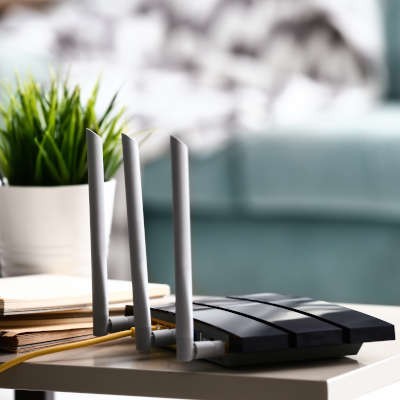PCSOFT Blog
Tip of the Week: 2 Things You Need to Know to Properly Set Up Your Wi-Fi
People are constantly using Wi-Fi. In fact, 87 percent of people admit to using public Wi-Fi connections, which consequently is one of the most common ways to get data stolen or devices inundated with malware. With so many people depending on Wi-Fi, and your business looking to use it for enhanced collaboration, we thought we should discuss a few hot tips to get you started in the right direction.
Your Router
When looking to set up a Wi-Fi connection, the first variable you need to consider is your hardware. Obviously, you have a modem that connects to the line the cable company has run into your office. Today, many cable companies have started to deliver modem/router combos that have a lot of utility for individuals. The cable company will charge a small rental fee each month, but you have one device for your Internet and Wi-Fi needs.
For the small business, you need to take a little more care, and therefore the modem/router combo isn’t probably going to work for your purposes. In fact, to be safe, businesses should purchase their own modem and their own routers (and any other hardware they’ll need). The reason is that the more control over the hardware a business owner or IT admin has, the more that hardware will be just the right specifications for that business’ needs.
Tip #1 - Get the Router Your Business Needs
For the small business a good router will run between $200-to-$1000 and you will get what you pay for. Your IT administrator or one of the technicians from PCSOFT can help you determine what hardware your business needs and justify their expense over the small fee charged by the cable company for the modem/router combo.
A good small business router should have the following options:
- WPA protection - Your business’ router needs to enhance network security. The router should have Wi-Fi Protected Access encryption built-in (WPA, WPA2, WPA3) and also have a built-in firewall.
- Multiple band support - Most routers today come with dual-band support built in. Depending on where your router is placed using both the 2.4 Ghz and the 5.0 Ghz bands can enhance your Wi-Fi network extensively.
- Multiple LAN and WAN Ports - A good rule of thumb is that you want at least three local area network (LAN) ports and at least one wide area network (WAN) port.
- Virtual Private Network - The VPN built into the router allows for additional encryption to be made to data when it’s sent and received.
- Speed through protocol support- Your business’ router has to support fast and secure wireless connections. That means it at least has to support the 802.11n protocol. Most modern routers will support the 802.11ac protocol, which is markedly faster.
- Gigabit ports - Some devices should be connected directly into the router. For these systems, you need fast ethernet connections available.
Tip #2 - Router Placement
Once you get the hardware that you’ll need, you need to know where to put the router to get the best wireless signal possible. You may purchase the top-tier Internet package from your ISP, but unless you set your hardware up correctly, you will be wasting money. You will want to make sure to do the following things to help you get the speeds that you pay for:
- Pick a central location - Obviously, the more centralized your router is placed, the better.
- Raise it off the floor - The higher up you can install your router the fewer obstructions you will likely have.
- Don’t place the router near other electronics - The more obstructions, the worse your signal strength will be. Some electronics, like microwaves, can interfere with 2.4 GHz bands.
- Map out signal before installing everything - If you have a router that doesn’t cover the breadth of your property, you should map out your Wi-Fi strength so you know where extenders will be the most helpful.
We hope this article will help you get the hardware you need for your uses and assist you in planning how you are going to have to set up that hardware in order to get the most out of your Wi-Fi connection. For more great tips and tricks, return regularly to our blog.



Comments